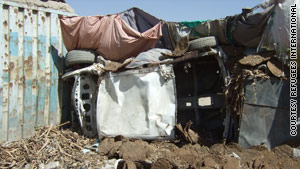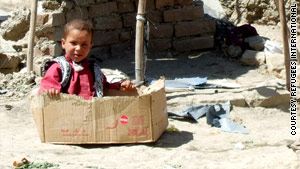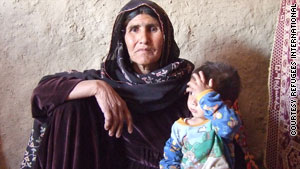June 25, 2011 -- Updated 2227 GMT (0627 HKT)

Afghans flee their country
STORY HIGHLIGHTS
- 91,000 have fled their homes in Afghanistan this year, Refugees International says
- Refugees make tent cities out of discarded objects like sheets and tarps
- Obama plans to withdraw 33,000 troops from Afghanistan within the next 15 months
- State Department says U.S. is committed to Afghanistan's long-term stability
"In the first five months of 2011, we have more than 91,000 people fleeing their homes. And this is in comparison to last year at the same time period when there was 42,000," Refugees International advocate Lynn Yoshikawa said.
"They are living in cramped corridors ... sharing homes, living outside in tents. They have a lot of difficulties with breathing conditions, very limited access to medical facilities to address the problems. A lot of it is chronic," said Yoshikawa.
Yoshikawa visited tent cities across Afghanistan earlier this year with her colleagues, taking photos of the refugees' living conditions and sharing them publicly for the first time with CNN.

Some tent cities are made of whatever discarded objects are nearby.
The humanitarian group warns that Afghans continue to be driven from their homes by coalition air strikes and special forces raids.
"There is still a lot of displacement happening and it's not being properly addressed," said Yoshikawa. "The military isn't reporting people that they see displaced from their military operations. That prevents humanitarian agencies from going to respond because often these are areas inaccessible because of these high levels of conflict."

A child plays in a cardboard box at one of the tent cities.
A U.S. State Department's spokeswoman said Friday that despite President Obama's announcement to withdraw 33,000 troops from Afghanistan within the next 15 months, the United States is committed to Afghanistan's long-term stability.
"We do continue to support efforts internally in Afghanistan to ensure that refugees are well managed," said State Department spokeswoman Victoria Nuland.

A displaced woman and child make their home at a tent city.
Yet questions remain about the extent of corruption within Afghanistan's security forces, including local police, who Refugees International says are now also driving Afghans from their homes.
"We talked to displaced people who said the Afghan local police, which are supported by U.S. military... are extorting money from people, demanding taxes, using their power to abuse civilians. They've also been implicated in allegations of murder and torture in these communities," explained Yoshikawa.
Refugees International says larger humanitarian concerns remain, with many displaced families fearful of returning home after fleeing violence.
The group says that many of those critical local police units, tasked with protecting Afghan residents, are now so corrupt that they should not be funded until strict recruiting and discipline standards are met.
RELATED TOPICS


No comments:
Post a Comment